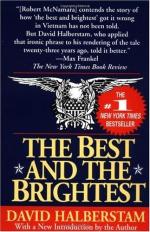
|
| Name: _________________________ | Period: ___________________ |
This quiz consists of 5 multiple choice and 5 short answer questions through Chapters 11-12.
Multiple Choice Questions
1. What does Halberstam say McNamara had done while he was at Ford?
(a) Busted a unionization attempt.
(b) Created a fiscal crisis.
(c) Innovated in the design of the production process.
(d) Raised the quality of the product without raising the cost.
2. On which issue does Halberstam say the military lost its battle with the White House?
(a) The use of napalm.
(b) Bombing in the north.
(c) The use of jets.
(d) The commitment of troops.
3. Why was Chester Bowles assigned to a different position?
(a) He had leaked confidential information to the press.
(b) He had quarreled with Bobby Kennedy over who was in charge in Kennedy's absence.
(c) He had disgraced himself by having an affair with one of his pages.
(d) He had been caught saying embarrassing things on an open mic.
4. What does Halberstam say Kennedy had done in response to the meeting with Russians in Vienna?
(a) He removed troops from Poland.
(b) He sent an advisory committee to Vietnam.
(c) He increased troop strength in Berlin.
(d) He reduced America's nuclear arsenal.
5. Why didn't Kennedy offer the position of Secretary of State to J. William Fulbright?
(a) Fulbright was too old and conservative.
(b) Fulbright had some unresolved scandals in his past.
(c) Fublright was too young and inexperienced.
(d) Fulbright did not have the support of Negroes or Jews.
Short Answer Questions
1. How does Halberstam say Dean Rusk felt in the Kennedy administration?
2. What position had Robert Lovett been appointed to in 1947?
3. What does Halberstam say was the sense in the Kennedy administration as they came into office?
4. When did Kennedy become well known in Washington?
5. Whom did Kennedy ask to be Secretary of State instead of Adlai Stevenson?
|
This section contains 368 words (approx. 2 pages at 300 words per page) |

|




